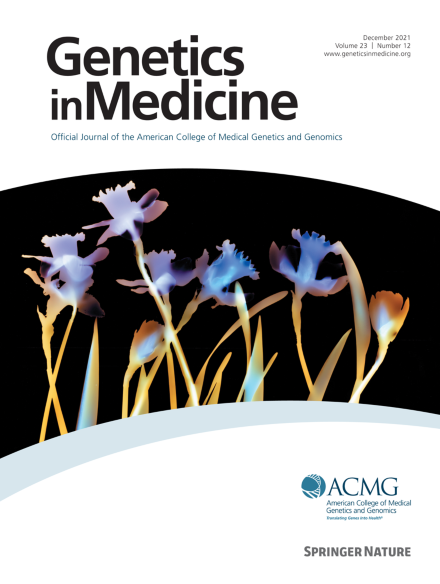机会性基因组筛查具有临床实用性:一项干预性队列研究。
IF 6.6
1区 医学
Q1 GENETICS & HEREDITY
引用次数: 0
摘要
背景:临床实践正转向基因组优先的方法,如机会性筛查次要结果(SFs)。对 SFs 的分析可扩展到医学上可操作的结果之外,包括非医学上可操作的单基因疾病风险、携带者状态、药物基因组变异以及常见复杂疾病的风险变异。然而,目前还缺乏有关返回这些结果的临床效用的证据。我们通过评估SFs的收益、对临床管理的影响以及SFs与参与者的临床特征和家族史之间的一致性,评估了对各种SFs进行机会性筛查的结果:方法:成年癌症患者在 GS 中可选择学习多个类别的 SFs。结果数据通过病历审查和参与者报告的测量方法收集,直至结果返回后一年:所有选择学习SFs的参与者(139人,85.6%为女性,平均年龄54.6岁)都报告了≥1项变异(100% [139/139])。药物基因组变异的报告率最高(97.8% [135/138] 参与者),其次是常见疾病风险变异(89.4% [118/132])、携带者状态(89.3% [117/131]),以及与孟德尔(27.2% [34/125])、医学可操作性(15.2% [21/138])和早发神经退行性疾病(2.6% [3/117])风险相关的变异。1.4%(2/138)的参与者报告了 ACMG 列表(v3.2,非癌症基因)中的 SFs。在所有类别中,有 28.1%(39/139)的参与者通过提示改变管理方法而证明了 SFs 的临床实用性。此外,相当一部分参与者的提示性临床特征(49.0% (24/49)])或家族史(21.8% (27/124))可能与其SFs有关:我们的研究结果表明,对多种 SFs 进行机会性筛查具有潜在的益处。本文章由计算机程序翻译,如有差异,请以英文原文为准。
Opportunistic genomic screening has clinical utility: An interventional cohort study
Purpose
Practice is shifting toward genome-first approaches, such as opportunistic screening for secondary findings (SFs). Analysis of SFs could be extended beyond medically actionable results to include non-medically actionable monogenic disease risks, carrier status, pharmacogenomic variants, and risk variants for common complex disease. However, evidence on the clinical utility of returning these results is lacking. We assessed the outcomes of opportunistic screening for a broad spectrum of SFs by evaluating the yield, impact on clinical management, and consistency between SFs and participants’ clinical features and family history.
Methods
Adult cancer patients had exome sequencing with the option to learn multiple categories of SFs. Outcomes data were collected through chart review and participant-reported measures up to one year after return of results.
Results
All participants (n = 139, 85.6% female, average 54.6 years old) who elected to learn SFs had ≥1 variant reported (100% [139/139]). The yield of reportable findings was highest for pharmacogenomic variants (97.8% [135/138] of participants), followed by common disease risk variants (89.4% [118/132]), carrier status (89.3% [117/131]), and variants related to Mendelian (27.2% [34/125]), medically actionable (15.2% [21/138]), and early-onset neurodegenerative (2.6% [3/117]) disease risks. SFs from the American College of Medical Genetics and Genomics list (v3.2, noncancer genes) were reported in 1.4% (2/138) of participants. SFs across all categories demonstrated clinical utility by prompting management changes in 28.1% (39/139) of participants. Moreover, a considerable proportion of participants had suggestive clinical features (49.0% (24/49)]) or family history (21.8% (27/124)) potentially related to their SFs.
Conclusion
Our findings indicate there are potential benefits from opportunistic screening for a broad range of SFs.
求助全文
通过发布文献求助,成功后即可免费获取论文全文。
去求助
来源期刊

Genetics in Medicine
医学-遗传学
CiteScore
15.20
自引率
6.80%
发文量
857
审稿时长
1.3 weeks
期刊介绍:
Genetics in Medicine (GIM) is the official journal of the American College of Medical Genetics and Genomics. The journal''s mission is to enhance the knowledge, understanding, and practice of medical genetics and genomics through publications in clinical and laboratory genetics and genomics, including ethical, legal, and social issues as well as public health.
GIM encourages research that combats racism, includes diverse populations and is written by authors from diverse and underrepresented backgrounds.
 求助内容:
求助内容: 应助结果提醒方式:
应助结果提醒方式:


